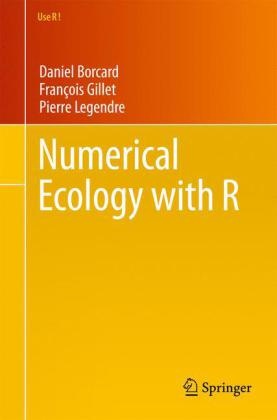Read more
Informationen zum Autor The three authors teach numerical ecology, both theoretical and practical, to a wide array of audiences, in regular courses in their Universities and in short courses given around the world. Daniel Borcard is lecturer of Biostatistics and Ecology and researcher in Numerical Ecology at Université de Montréal, Québec, Canada. François Gillet is professor of Community Ecology and Ecological Modelling at Université de Franche-Comté, Besançon, France. Pierre Legendre is professor of Quantitative Biology and Ecology at Université de Montréal, Fellow of the Royal Society of Canada, and ISI Highly Cited Researcher in Ecology/Environment. Klappentext Numerical Ecology with R provides a long-awaited bridge between a textbook in Numerical Ecology and the implementation of this discipline in the R language. After short theoretical overviews, the authors accompany the users through the exploration of the methods by means of applied and extensively commented examples. Users are invited to use this book as a teaching companion at the computer. The travel starts with exploratory approaches, proceeds with the construction of association matrices, then addresses three families of methods: clustering, unconstrained and canonical ordination, and spatial analysis. All the necessary data files, the scripts used in the chapters, as well as the extra R functions and packages written by the authors, can be downloaded from a web page accessible through the Springer web site(http://adn.biol.umontreal.ca/~numericalecology/numecolR/). This book is aimed at professional researchers, practitioners, graduate students and teachers in ecology, environmental science and engineering, and in related fields such as oceanography, molecular ecology, agriculture and soil science, who already have a background in general and multivariate statistics and wish to apply this knowledge to their data using the R language, as well as people willing to accompany their disciplinary learning with practical applications. People from other fields (e.g. geology, geography, paleoecology, phylogenetics, anthropology, the social and education sciences, etc.) may also benefit from the materials presented in this book. The three authors teach numerical ecology, both theoretical and practical, to a wide array of audiences, in regular courses in their Universities and in short courses given around the world. Daniel Borcard is lecturer of Biostatistics and Ecology and researcher in Numerical Ecology at Université de Montréal, Québec, Canada. François Gillet is professor of Community Ecology and Ecological Modelling at Université de Franche-Comté, Besançon, France. Pierre Legendre is professor of Quantitative Biology and Ecology at Université de Montréal, Fellow of the Royal Society of Canada, and ISI Highly Cited Researcher in Ecology/Environment. Zusammenfassung This much anticipated volume maps the connections between numerical ecology and its implementation in the `R' language. Beginning with concise theoretical overviews, the authors go on to explore the methodology using applied and extensively annotated examples. Inhaltsverzeichnis Introduction.- Exploratory data analysis.- Association measures and matrices.- Cluster analysis.- Unconstrained ordination.- Canonical ordination.- Spatial analysis of ecological data.  ...

